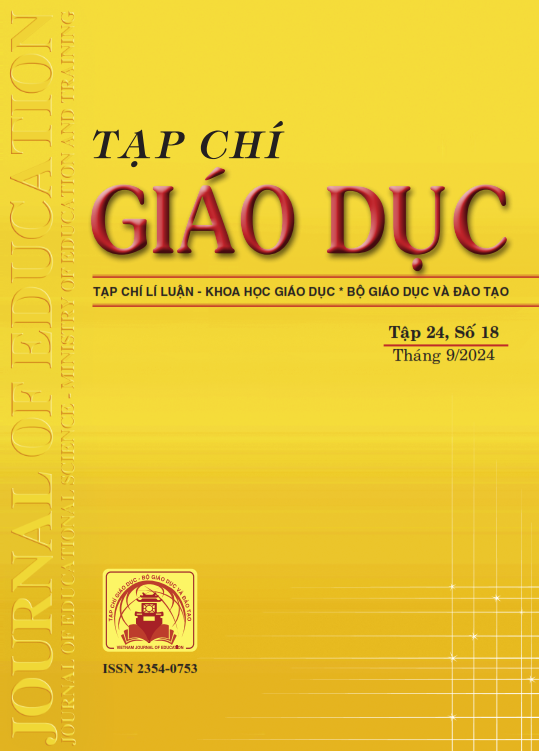Một số bình luận và khuyến nghị nhằm nâng cao năng lực giảng viên tại các trường đại học Việt Nam
Tóm tắt
After years of reform efforts, the working staff and the faculty in particular at Vietnamese universities have achieved great growth in both volume and quality. However, in the contemporary context with new demands, some limitations have been revealed among the faculty. This study proposes a framework for improving faculty capacity to meet the needs of higher education innovation to become the driving force for socio-economic development in Vietnam. Using the method of document analysis combined with the experience in assessing education quality, the author presents a framework with 4 core contents: (1) Faculties’ competency, responsibilities and orientations for developing their tasks; (2) Integrating research and teaching to enhance outcome qualities and the employability of graduates; (3) Participating in community engagement activities and service to fulfill the third mission of the university; (4) Choosing a personal teaching philosophy that governs professional activities, shaping the beliefs, values and attitudes that a higher education lecturer needs to demonstrate. Based on the research results, the author recommends that all four contents should be fully implemented and used as benchmarks for the corresponding criteria in the Set of Criteria for Assessing (1) the Quality of Higher Education at the institutional and (2) the training programmes.
Tài liệu tham khảo
Altbach, P. G., Reisberg, L., & Rumbley, L. E. (2019). Trends in global higher education: Tracking an academic revolution (Vol. 22). Brill.
Ardalan, K. (2008). The philosophical foundation of the lecture‐versus‐case controversy: Its implications for course goals, objectives, and contents. International Journal of Social Economics, 35(1/2), 15-34. https://doi.org/10.1108/03068290810843819
Biggs, J., & Tang, C. (2011). Train-the-trainers: Implementing outcomes-based teaching and learning in Malaysian higher education. Malaysian Journal of Learning and Instruction, 8, 1-19.
Cục Quản lí chất lượng (2019). Công văn số 1669/QLCL-KĐCLGD ngày 31/12/2019 về việc thay thế Tài liệu đánh giá chất lượng chương trình đào tạo các trình độ của giáo dục đại học (ban hành kèm theo Công văn số 769/QLCL-KĐCLGD).
Dalglish, S. L., Khalid, H., & McMahon, S. A. (2020). Document analysis in health policy research: The READ approach. Health Policy and Planning, 35(10), 1424-1431. https://doi.org/10.1093/heapol/czaa064
Đặng Ứng Vận (2024). Từ triết lí giáo dục đến việc dạy và học đại học. NXB Đà Nẵng.
De Corte, E., Verschaffel, L., & Masui, C. (2004). The CLIA-model: A framework for designing powerful learning environments for thinking and problem solving. European Journal of Psychology of Education, 19(4), 365-384. https://doi.org/10.1007/BF03173216
Desai, K. V., Gatson, S. N., Stiles, T. W., Stewart, R. H., Laine, G. A., & Quick, C. M. (2008). Integrating research and education at research-extensive universities with research-intensive communities. Advances in Physiology Education, 32(2), 136-141. https://doi.org/10.1152/advan.90112.2008
Hensel, N. H. (2018). Course-Based Research Mentoring. In Course-Based Undergraduate Research (pp. 223-231). Routledge.
Kandlbinder, P. (2013). Signature concepts of key researchers in higher education teaching and learning. Teaching in Higher Education, 18(1), 1-12. https://doi.org/10.1080/13562517.2012.694102
Kwiek, M. (2012) Changing higher education policies: From the deinstitutionalization to the reinstitutionalization of the research mission in Polish universities. Science and Public Policy, 39(5), 641-654. https://doi.org/10.1093/scipol/scs042
Neumann, R. (1996). Researching the teaching-research nexus: A critical review. Australian Journal of Education, 40(1), 5-18. https://doi.org/10.1177/000494419604000102
Nguyễn Phú Trọng (2022). Một số vấn đề lí luận và thực tiễn về chủ nghĩa xã hội và con đường đi lên chủ nghĩa xã hội ở Việt Nam. NXB Chính trị Quốc gia - Sự thật.
Phạm Hùng Hiệp, Phan Thị Thanh Thảo, Phạm Thị Oanh, Vũ Minh Huyền, Đỗ Kim Dung (2023). Phân tích chính sách tự chủ đại học Việt Nam từ góc nhìn của lí thuyết Quản lí công mới (NPM). Tạp chí Giáo dục, 23(12), 34-40.
Szadkowski, K. (2013). University's Third Mission as a Challenge to Marxist Theory. Człowiek i Społeczeństwo, 35(1), 203-218.
Trow, M. (2010). Twentieth-century higher education: Elite to mass to universal. Johns Hopkins University Press.
van Dijk, E. E., van Tartwijk, J., van der Schaaf, M. F., & Kluijtmans, M. (2020). What makes an expert university teacher? A systematic review and synthesis of frameworks for teacher expertise in higher education. Educational Research Review, 31. https://doi.org/10.1016/j.edurev.2020.100365
Wach, E., & Ward, R. (2013). Learning about qualitative document analysis. https://opendocs.ids.ac.uk/opendocs/ handle/20.500.12413/2989
Yan, W. (2022). Improving Teaching Effectiveness in Higher Education. In 2022 International Conference on Science Education and Art Appreciation (SEAA 2022) (pp. 1126-1134). Atlantis Press.
Tải xuống
Đã Xuất bản
Cách trích dẫn
Số
Chuyên mục
Giấy phép

Tác phẩm này được cấp phép theo Ghi nhận tác giả của Creative Commons Giấy phép quốc tế 4.0 .












